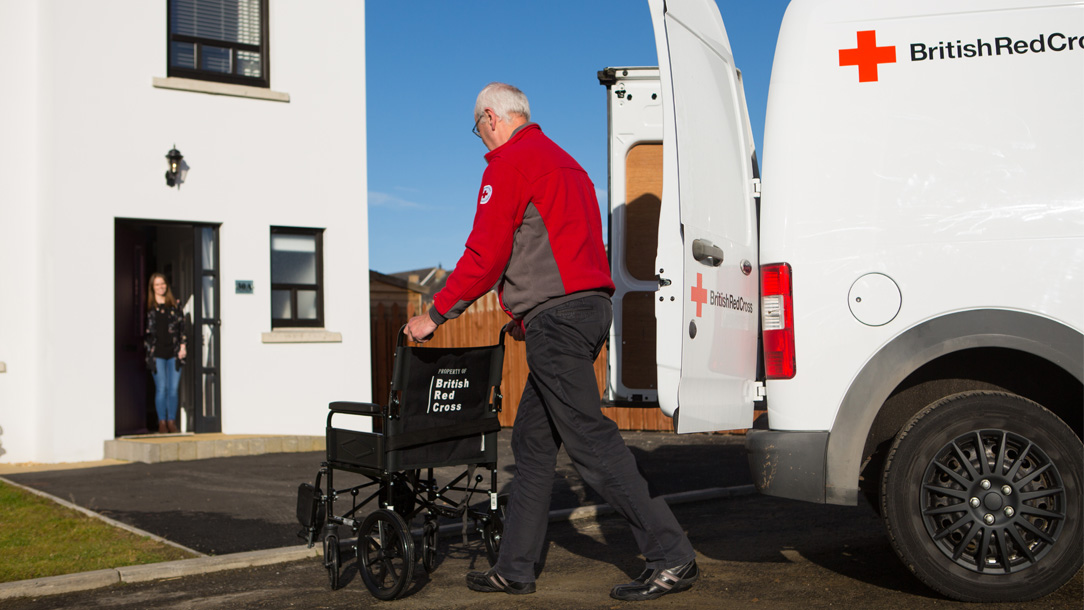"Last year, we loaned almost 60,000 wheelchairs across the UK"
Last updated 20 July 2023
By Fiona MacLeod, director for independent living and crisis response
It's easy to fall into a pattern of isolation and loneliness if you become immobile, our research has found. That's why we're loaning wheelchairs - and calling for a change in the law. Imagine you have just had surgery on your hip after a bad fall. You’ve been in hospital recovering and you’ve been told you mustn’t put any weight on your leg. You are ready to go home and you can’t wait to get back, make your own dinner, see your friends, go to the shops. With your crutches in hand and longing for home, you’re on your way.
But it’s much harder than you expect and you realise crutches aren’t a suitable aid for you. You try to explain this, but are simply told that is all that’s on offer. Gradually you realise you are going to struggle.
Many people just accept that they are stuck at home. They may be unable to get out or go to work, and have to depend on others. Some face days or months of isolation, loneliness and even depression.

©Ben Langdon/British Red Cross
Red Cross wheelchairs can help
However, here at the British Red Cross we have a solution that’s made a big difference to millions of people over the years – a wheelchair. We’ve been loaning them since the First World War. And today you can borrow or hire a wheelchair from us if you need one.
Last year we loaned almost 60,000 wheelchairs across the UK. Every day, our volunteers hear what a huge difference our chairs can make.
By providing this service, we have learned what people need and seen the gaps in provision. We’ve also found out that a large number of people could benefit from a wheelchair in the short term, but for a number of reasons don’t have access to one.
What about the NHS?
Currently, NHS wheelchair services meet long-term needs, but are not required to meet short-term needs. These are usually defined as less than six months.
This means that if you have a permanent disability or illness, the NHS will provide a wheelchair. If not, you may not get one even if you have a broken leg or have had surgery - this leaves a big hole in the system for short-term wheelchair users, who may need support for six months while an injury heals.
- Learn more about Red Cross wheelchair hire
Maintaining mobility: research shows wheelchairs make a difference
We recently carried out research called Maintaining mobility* that explored the unmet need for short-term mobility aids. Across the UK we asked all 139 listed NHS wheelchair providers about their service.
The research found that only 25 NHS wheelchair providers supply wheelchairs for short-term use. Almost half of those who do not offer short-term wheelchair loans said it was because there was no statutory duty (something they had to do by law) to do so. Sixteen providers cited a lack of funding and resources.
The research also found that an estimated 4.3 million adults in the UK (eight per cent) had a short-term mobility issue in the past 12 months. Many of them might have benefitted from having a wheelchair.
In addition, not accessing a wheelchair had considerable negative effects on people, their family, friends and carers, and the wider health and care system.
The conclusion was clear: the current system is failing people. Reform is needed.
Better access to wheelchairs: the Red Cross speaks out
That’s why we are calling for change to ensure everyone who needs a wheelchair is able to get one quickly and easily, for as long as they need it.
Ultimately, we would like a statutory duty for short-term wheelchairs in line with long-term provision.
In the meantime, we are calling on the health and care sector to better understand the needs of people with short-term mobility issues. We also want to see better provision of short-term wheelchairs locally.
It’s a simple solution, it might not be right for everyone, and it won’t fix all the problems.
But consider the case of a 40-year-old man in Edinburgh, who was worried how he would keep his business going and care for himself after he broke his ankle.
“A wheelchair wouldn’t have solved everything,” his partner told us, “but it would have enabled him to get around.”
Our research shows that no-one should be denied a chair just because their problem is viewed as temporary. It’s now time to let the brakes off.
- Read our Maintaining mobility research report
- We call for better access to wheelchairs
- Hire a wheelchair from the British Red Cross
- Hire a commode, toilet seat or toilet frame
*The research was commissioned by the British Red Cross and carried out by Kantar Public.

Fiona MacLeod
Director for independent living and crisis response
Keeping people moving
No one should feel trapped. Your donation will help us make sure someone who needs a wheelchair or other mobility aid can get one.
Donate